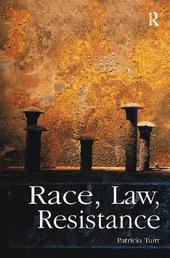
|
Race, Law, Resistance
Paperback
Main Details
| Title |
Race, Law, Resistance
|
| Authors and Contributors |
By (author) Patricia Tuitt
|
| Series | Glasshouse S. |
|---|
| Physical Properties |
| Format:Paperback | | Pages:240 | | Dimensions(mm): Height 234,Width 156 |
|
| ISBN/Barcode |
9781904385066
|
| Classifications | Dewey:342.0873 |
|---|
| Audience | | Tertiary Education (US: College) | | Professional & Vocational | |
|---|
|
Publishing Details |
| Publisher |
Taylor & Francis Ltd
|
| Imprint |
Routledge Cavendish
|
| Publication Date |
18 May 2004 |
| Publication Country |
United Kingdom
|
Description
Race, Law, Resistance is an original and important contribution to current theoretical debates on race and law. The central claims are that racial oppression has profoundly influenced the development of legal doctrine and that the production subjugated figures like the slave and the refugee has been fundamental to the development of legal categories such as contract and tort. Drawing on examples from the UK and US legal systems in particular, this book employs a wide range of theoretical and disciplinary perspectives to explore resistance to racial dominance in modernity. In particular, it highlights the main tenets and distinctive scholarly forms of critical theories on race and law. Race, Law, Resistance will be of interest to academics and students following courses on critical race theory, law and postcolonialism, discrimination law, legal theory, legal systems, the law of obligations, comparative legal cultures, law and literature, and human rights.
Author Biography
Patricia Tuitt is Lecturer in Law at Birkbeck College, University of London.
Reviews'The publication of Patricia Tuitt's collection marks an important moment in the application of postcolonial theory to law in this country. Whereas in the US, scholarship on the relationship between race and law emerged more or less contemporaneously with feminist scholarship, British "critical race theory" has been slow to find a foothold. On this ground alone, Race, Law, Resistance would merit the attention of Scholars. It claims are furthered by the fact that Tuitt engages not only with issues of legal theory but also with a number of fields of substantive law, notably torts and the legal regime governing the treatment of refugees. Though stylistically elegant, this is not a collection that wears its theoretical learning lightly, and several of the essays are challenging reads. My favourite are those that engage most closely with sustained legal examples. These include a thought provoking analysis of the racial dynamics of supposedly neutral principles of legal causation; a persuasive deconstruction of the "reasonable man" of the law of tortious negligence, in which the argument that reasonableness tests are inevitably imbued with cultural (and hence potentially racist) assumptions is invoked to illuminate cases concerning deaths in custody; and an imaginable interpretation of "fortress Europe" against refugees as analogous to the discredited colonial doctrine of terra nullius, in which the claims of indigenous peoples to and rights were dismissed by means of a normative conception of property ownership that excluded non-Western modes of cultivation and occupation.The ambitious claims of theses and other chapters are unfailingly provocative. Overall, this stimulating collection exemplifies the best of critical legal scholarship and deserves a wide audience'. Times Higher Educational Supplement, 27th May 2005. Race, Law, Resistance, which employs social philosophy to explore law, legal doctrine, sovereignty, identity, and violence from a standpoint internal to law, is a welcome contribution to the existing body of research on race and ethnicity...social scientists who are interested in researching the relationship between law and race can gain much from its depth of insight into the interpretive underside of the law. BY examining how legal doctrine and legal reasoning can operate as vehicles of racial violence and domination, this collection of essay draws attention to an important yet neglected area of research within both legal studies and social sciences.' Journal of Law and Society, volume 32 number 4 (2005). By Seza Banakar, University of Westminster.
|